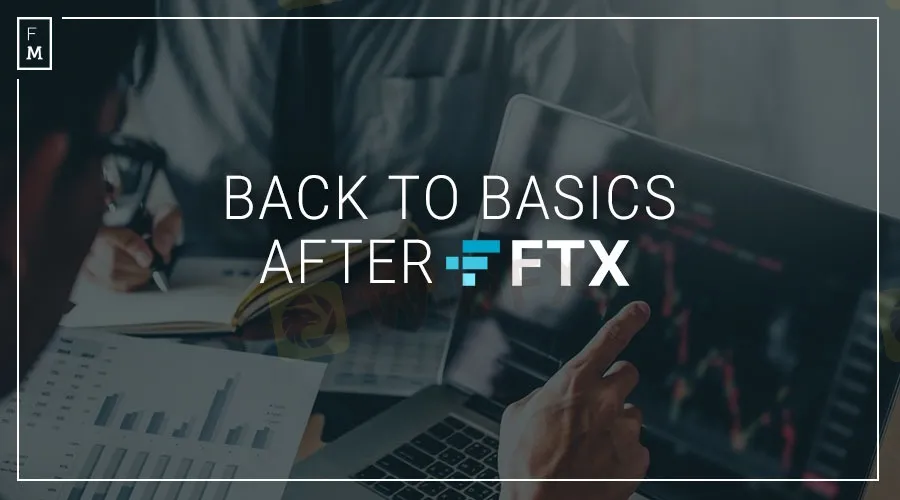简体中文
繁體中文
English
Pусский
日本語
ภาษาไทย
Tiếng Việt
Bahasa Indonesia
Español
हिन्दी
Filippiiniläinen
Français
Deutsch
Português
Türkçe
한국어
العربية
Back to Basics after FTX
Abstract:The FTX collapse puts a spotlight on flaws and contradictions in centralized crypto platforms. Blockchain transparency and verification over trust are integral to Bitcoin and crypto.

The crypto world is currently in a state of intense turbulence due to developments around the major crypto exchange, FTX, which is in a state of near-total collapse. Investors are coming to terms with what looks like irrecoverable losses, and notably, the venture capital firm, Sequoia Capital has marked the value of its stake in FTX down to zero.
Take Advantage of the Biggest Financial Event in London. This year we have expanded to new verticals in Online Trading, Fintech, Digital Assets, Blockchain, and Payments.
For a brief moment this week, it looked as if the finale to the ongoing FTX implosion was to be its acquisition by rival exchange Binance. There would still have been plenty to unpack after that, but in the end, that outcome never came to pass.
In fact, what followed was alarming, as, if we are to believe everything presented on the surface, Binance began the process of due diligence; a process which, along with reports of mishandled customer funds and agency investigations into FTX, immediately prompted Binance to abandon the proposed rescue deal.
In the wider crypto-sphere, the result of FTX‘s collapse, and the manner in which it occurred, has been a highly emotional mixture of disorientation and roiling disbelief. It’s fair to say that FTX going under is a greater bombshell than any of the other shattering detonations that have hit crypto this year, and the entire space is reeling and exhausted.
Something tangibly different now, as opposed to earlier in the year when other crypto platforms were teetering, is the expressions of outright anger, which are aimed, for the most part, at the FTX Founder and CEO, Sam Bankman-Fried (known as SBF).
Perhaps it had seemed like the worst was over this year for crypto, and perhaps there is a sinking realization of the damage done by FTX, both to its investors and to the reputation of the entire crypto sector, in which there are a large number of honest developers looking to build working, valuable products.
There is likely also a feeling among some of having been duped, as a conspicuous aspect of SBFs public persona was the projection of essentially good intentions, for example through promoting the philosophy of effective altruism.
However, despite the raw emotion on display at the moment, there are some practical, important realizations that the entire current debacle is bringing to the surface.
A Better Alternative?
Bitcoin was brought into existence to become a better alternative to fiat money and central banks, DeFi emerged as an attempt to create financial systems that were superior to those already in place, and both have decentralization at their core.
This much is obvious, and so when centralized entities became dominant, it should have been immediately recognizable that this was not what was supposed to play out.
Also, disconcerting is the idea that individual actors in powerful positions can steer crypto in ways that go against every central ethos. Don't forget, by contrast, that the creator of Bitcoin, Satoshi Nakamoto, is pseudonymous and let his creation run by itself once it had been set in motion.
If what has now sprung into being is platforms that are not far from what traditional finance already had to offer, with the main differences being that crypto's platforms are unregulated and perilous, then something has gone awry.
Viewed from this perspective, a blow-up was inevitable. After all, whats the long-term purpose of constructing a precariously dishonest financial system in the hinterlands, and how long could that possibly last anyway?
Bitcoin Is Not a Crypto
With every platform that collapses and every hollow new token that washes over the market, the case for Bitcoin, which continues, always, to operate exactly as it should, is strengthened.
Does this mean that everyone must become a Bitcoin maximalist and eschew other blockchains altogether? Arguably not, since there are some other networks that are built optimally, and with practical intentions in mind.
However, its noticeable that every bear market and catastrophe shifts some of those who remain in crypto towards Bitcoin and the maxi way of thinking, and it might, over the coming years, be a positive development if the crypto carnival were gradually streamlined down to only its most useful components.
Disaster Scaled
As crypto scales and expands, so do its mishaps. What‘s happening now is being compared to the Mt Gox bankruptcy of 2014, but a difference is that Mt Gox wasn’t on so many peoples radars outside of crypto. FTX, by comparison, is more visible, and the non-crypto world is paying attention.
That said, there is still a distinct separation between crypto and traditional finance. On the positive side, this means a crypto collapse is unlikely to spread contagion to the broader financial world. However, this accentuates a barrier that crypto may hit as it moves towards integrating with (or even superseding) traditional finance.
After all, who would look at the damage done this year in crypto, and then want to remove the airlock separating crypto and traditional structures?
It could be argued that the standard financial and economic setup isnt looking too sturdy either, but then, if entities like FTX are center stage, what kind of choice does crypto appear to offer: a greater variety of perils to add to the ones that already exist?
A key tenet of the crypto movement has been that the blockchain never lies, and another critical point is that we must verify not trust. This means that a decentralized blockchain mechanism removes the need to rely on either centralized third parties or regulatory bodies.
Or perhaps these principles really did only ever apply to Bitcoin, in which case, once again, we must return to basics.

Disclaimer:
The views in this article only represent the author's personal views, and do not constitute investment advice on this platform. This platform does not guarantee the accuracy, completeness and timeliness of the information in the article, and will not be liable for any loss caused by the use of or reliance on the information in the article.
Read more

Kraken Offers $105 Fee Credit for FTX Fund Recipients
Kraken offers $105 in trading fee credits to FTX fund recipients, enabling $50,000 in crypto trading on Kraken Pro with zero fees. Secure your funds today!

Good News Malaysia: Ready for 5% GDP Growth in 2025!
Malaysia's economy is on track to sustain its robust growth, with GDP expected to exceed 5% in 2025, according to key government officials. The nation's economic resilience is being driven by strong foreign investments and targeted government initiatives designed to mitigate global economic risks.

Oriental Kopi’s IPO: Worth the Buzz or Not?
Kopi Holdings Bhd, a café chain operator under the brand Oriental Kopi, is gearing up for its listing on the ACE Market of Bursa Malaysia. The company has garnered a positive valuation from Mercury Securities Sdn Bhd, which has assigned a fair value of 68 sen per share, citing strong earnings growth potential driven by outlet expansions and increasing contributions from fast-moving consumer goods (FMCG) sales.

Tradu Introduces Tax-Efficient Spread Betting for UK Traders
Tradu’s introduction of tax-efficient spread betting and groundbreaking tools like the Spread Tracker signals a new era of accessible, competitive, and innovative trading solutions for UK investors.
WikiFX Broker
Latest News
Bitcoin in 2025: The Opportunities and Challenges Ahead
BI Apprehends Japanese Scam Leader in Manila
Join the Event & Level Up Your Forex Journey
Is There Still Opportunity as Gold Reaches 4-Week High?
Bitcoin miner\s claim to recover £600m in Newport tip thrown out
Good News Malaysia: Ready for 5% GDP Growth in 2025!
FXCL Lucky Winter Festival Begins
Warning Against MarketsVox
Is the stronger dollar a threat to oil prices?
Rising Risk of Japan Intervening in the Yen's Exchange Rate
Currency Calculator






